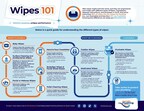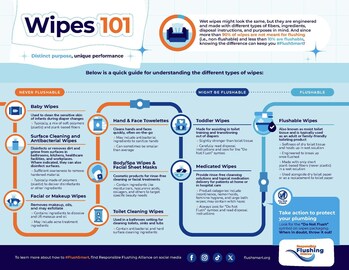Looking for the "Do Not Flush" symbol on wet wipes indicates the wet wipe goes in the trash, never the toilet. Your plumber will thank you.
SEATTLE, April 25, 2024 /PRNewswire-PRWeb/ -- Today the Responsible Flushing Alliance (RFA) is celebrating "National Hug A Plumber Day" by encouraging consumers to follow smart flushing habits, including always looking for the "Do Not Flush" symbol on the front of non-flushable wipes such as baby wipes, cleaning wipes, and makeup removal wipes.
As a non-profit dedicated to consumer education around what should and shouldn't be flushed, the RFA launched its #FlushSmart public service campaign in 2021. Preventing toilet clogs not only saves people money but it also protects the health of our communities and our pipes.
"Through a national consumer survey, we found 78% of adults recalled seeing the 'Do Not Flush' symbol, which is great," said Lara Wyss, President of the Responsible Flushing Alliance. "However, 53% of those surveyed also said they have flushed something they knew they shouldn't in the past year. That means we owe plumbers a lot of hugs."
When products that aren't meant to be flushed down the toilet wind up in the sewer system, it can cause serious threats to public and environmental health. In fact, estimates show that local public agencies throughout U.S. (and the ratepayers they represent) are spending more than $440 million annually to repair wastewater treatment equipment and respond to sewer overflows caused by improper flushing of "Do Not Flush" wipes.
Just last month, RFA released a report from a sewage collection study where wipes industry experts and sanitation agencies collaborated to see what's really being flushed. The findings were interesting (see this ):
- 34.1% wipes labeled with the "Do Not Flush" symbol (baby wipes, cleaning wipes, makeup wipes, etc.)
- 64.9% other non-flushable items (paper towels, period products, trash, etc.)
- 0.9% wipes labeled as flushable (which were in the process of disintegrating)
Non-flushable wipes marked with the "Do Not Flush" symbol are made with long, often synthetic (plastic) fibers and are made to be strong and durable but not break down in water. Wipes labeled as flushable must be made with short, 100% plant-based fibers that are designed to break down in water, similar to toilet paper.
It's also important not to pour fats, oils, or grease (FOGs) down the sink or toilet. When FOGs combine with non-flushable items, they can form cement-like clogs called fatbergs or cause overflow incidents where wastewater spills into rivers and streams. The Environmental Protection Agency estimates there are between 23,000-75,000 overflows per year in the U.S.
There are easy things people can do to prevent toilet clogs and sewage overflows, including not treating the toilet like a trash can.
What Not to Flush:
- Baby Wipes or Household Cleaning Wipes
- Paper Towels, Facial Tissue, Makeup Wipes
- Fats, Oils, and Grease
- Food, Trash, Plastic Bags
- Rags, Cloth, Disposable Gloves
- Cotton Balls, Cotton Swabs, Dental Floss
- Feminine Products
- Hair/Hair Weaves
- Medications/Syringes
- Wet wipes, or any products, labeled "Do Not Flush"
By following these simple steps, plumbers around the country will feel hugged and appreciated.
For more information about the #FlushSmart campaign, including free and downloadable educational materials, please go to .
About Responsible Flushing Alliance
The Responsible Flushing Alliance (RFA) is a 501(c)(6) non-profit organization dedicated to consumer education focused on what not to flush. RFA's goal is to change consumer behavior to help reduce damage to our nation's sewage systems caused by objects and materials not designed to be flushed. For more information, visit or on , , , , and .
Media Contact
Lara Wyss, Responsible Flushing Alliance, 206-487-4570, [email protected],
SOURCE Responsible Flushing Alliance



Share this article